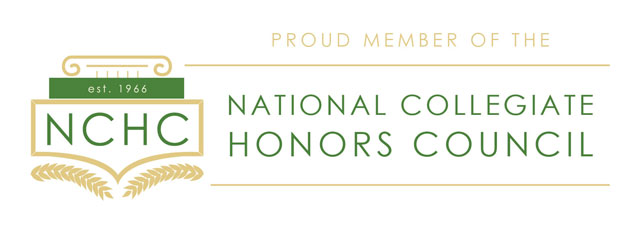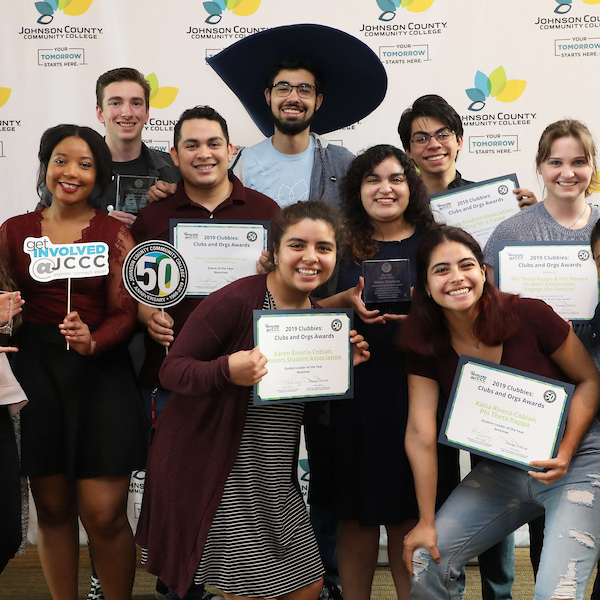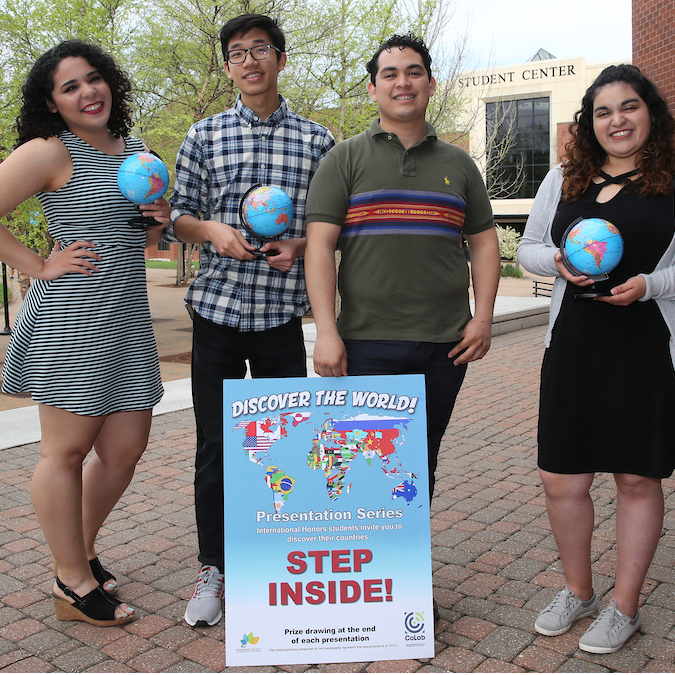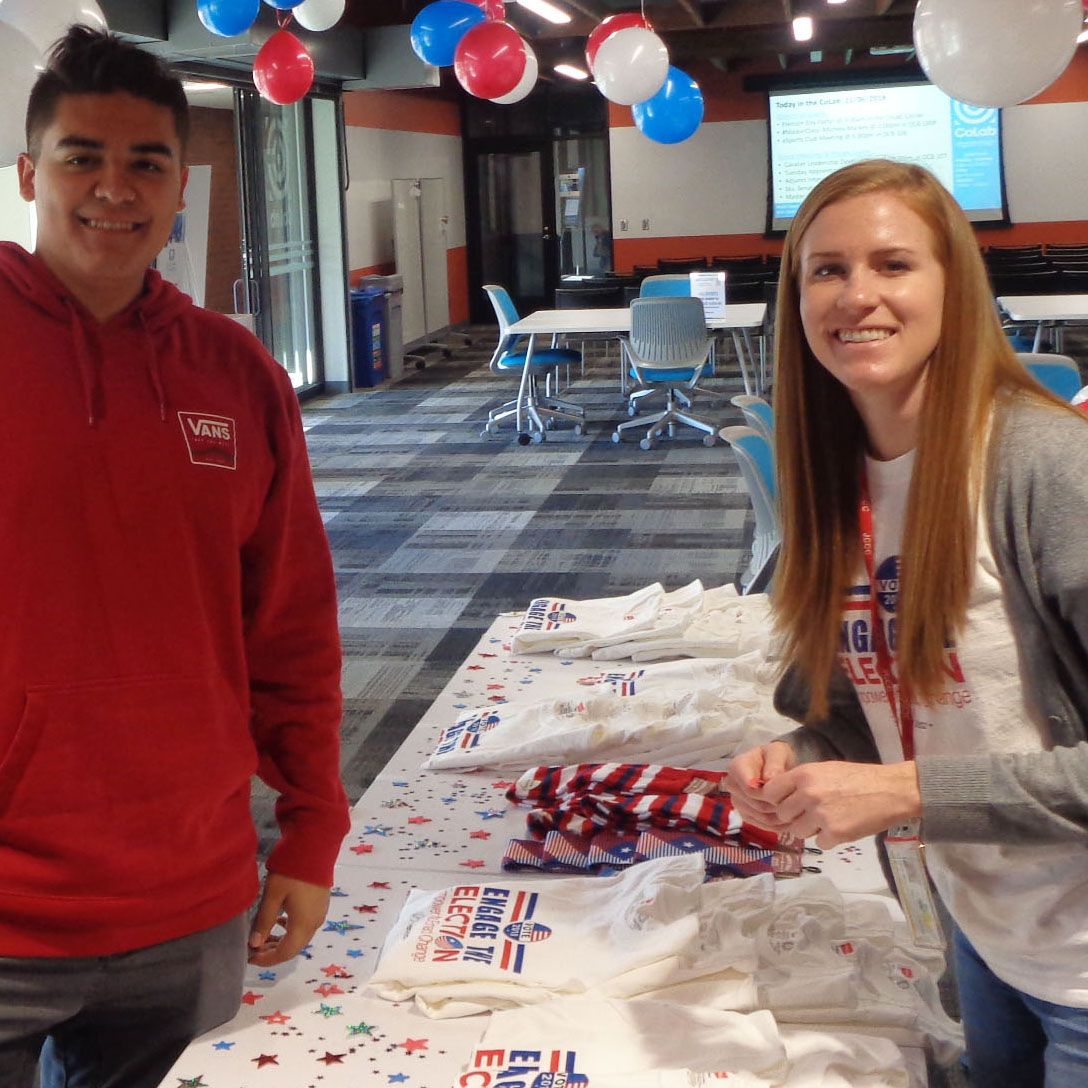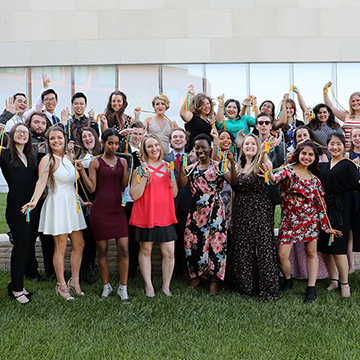Choosing to enhance your JCCC educational experience with honors means enhancing a fantastic education by taking on challenging coursework and engaging in co-curricular experiences — all while maintaining a competitive GPA.
Most of all, joining the Honors Program means joining a community of curious and ambitious scholars who are supported in their endeavors by our attentive staff and special honors counseling.
Graduating with Honors from JCCC
As students take honors courses, develop honors contracts, engage in exploratory experiences, give public presentations, or reflect on their honors path in a portfolio, they will earn points. Honors students are supported as they choose the path that accommodates their curricular constraints while enhancing their JCCC experience. The point system empowers students to own their honors experience and make it entirely their own.
To graduate with honors, students will be expected to take the Honors Seminar (HON 100) in their first year in the program, to choose an Honors Forum (HON 270) that meets their interest and to earn 20 points over the course of their JCCC degree.
Honors Coursework
The Honors Program offers many courses every semester that satisfy general education requirements.
Students can count on ENGL 121: Composition I-Honors, ENGL 122: Composition II-Honors, and COMS 121: Public Speaking-Honors being offered every term.
During the fall semester, the Honors Program commonly offers EVRN 130: Environmental Science-Honors and EVRN 131: Environmental Science Lab-Honors, MATH 241: Calculus-Honors, PHIL 143: Introduction to Ethics-Honors, PSYC 130: Introduction to Psychology-Honors, and SOC 122: Introduction to Sociology-Honors.
During the spring semester, the Honors Program commonly offers BIOL 135: Principles of Cellular and Molecular Biology Honors, ECON 231: Principles of Microeconomics Honors, REL 120: Exploring World Religions, SOC 125: Social Problems-Honors, and MATH 181: Statistics-Honors.
See the JCCC Catalog of Courses and Programs for more information about General Education requirements.
Honors contracts are a means for honors students to gain more knowledge about specific topics covered in a class that is not offered as an honors course.
The honors contract should not be considered as a replacement for a course but instead as a stepping stone to the next phase of your education. As such, it might be an opportunity:
- to gain a research experience
- to refine your writing skills
- or simply to enhance your learning in a technical field where honors courses are few and far between.
The focus of the contract is determined in discussion between the student and faculty mentor and subject to the approval of the director of the Honors Program.
The Honors Forum is a 3-credit hour course required for completion of Honors Program requirements. The topic, instructor and meeting time change each semester to accommodate student schedules and address as many of your diverse interests as we are able. The class is discussion-based and students provide input into class activities and structure.
The course combines an emphasis on interdisciplinarity with an affirmation of students’ critical and creative thinking skills. Students can expect to refine their research skills and develop their ability to work in teams to offer solutions to intractable problems faced locally or worldwide.
Honors Forum courses have included topics such as “Native and Western Views of Nature,” “Political Campaigns,” “Material Culture and Sustainability” and “Community Gardens.”
Exploratory Requirements
One of the goals of the Honors Program is to expand your horizon and challenge you to reconsider long held assumptions. We believe that such a tall order may be met by exposing yourself to artistic expressions of various kinds; this may include going to the ballet, seeing a play, watching a foreign film, going to the opera, walking through an exhibit, attending an artist talk at the Nerman or a scholar’s presentation on campus, etc.
The JCCC service-learning program defines service learning as “a teaching and learning strategy that integrates meaningful community service with instruction and reflection to enrich the learning experience, teach civic responsibility, and strengthen communities.” The 20-hour service-learning option offered by the Honors Program is intended to help you gain an appreciation for the value of involvement in your community and recognize the obligation of citizens to engage in civic activities.
A variety of activities are available for you to fulfill this program option, or you may propose your own. The service-learning experience is coordinated through the High Impact Practices specialist, Melissa Nolan. Contact her at mnolan13@jccc.edu.
If you select the service-learning option, you will document your activities by writing a reflection paper and submitting it to the Honors Program director at the end of the semester in which the service learning was done.
Visit the JCCC Service Learning Office for more information on combining community service with what you learn in the classroom.
Visit the JCCC Study Away office to learn about opportunities in more than 30 countries.
If you are working toward completing the Honors Program, you are encouraged to study abroad. The experience can broaden horizons, shift perspectives and change lives. Studying abroad fulfills one of your exploratory requirements to graduate from the Honors Program. You may spend a semester or a minimum of one week abroad.
JCCC Honors students are also eligible to participate in the Partners in the Parks program, where they live and learn in a national park for a week.
If studying abroad or away is not an option for you, we encourage you to consider the Global Awareness Program offered by the International Education Office.
Securing an internship can be challenging within the first two years of college, but it is so valuable! It goes without saying that hands-on work experience will allow you to develop and refine skills, gain confidence therefore making you more competitive on the job market. It will also give you a chance to network with professionals in a professional environment you have elected for your career.
Conversely, an internship may also allow you to explore a career path you had not considered or realize that the career path you had been considering was really not the right fit for you! No internship is ever wasted; in the best-case scenario, you may also get some immediate financial benefits! Internships may be secured locally, or online.
What can be more exhilarating than finding the cure to cancer or COVID? Most of us won’t get to have this precise experience, but engaging in research in college, outside of class requirements, holds many benefits. For those of you who are considering post-baccalaureate degrees, you will want to try your hand at research not only to see if you like it, but also because graduate schools will expect you to have had research experiences in college.
Doing research in college is a great way to explore careers, bolster skills that you acquired in the classroom such as communication, problem solving or time management and develop strong ties to a faculty mentor. Undergraduate research may happen in disciplines across the college from Biology to Environmental Science to History or Communications.
